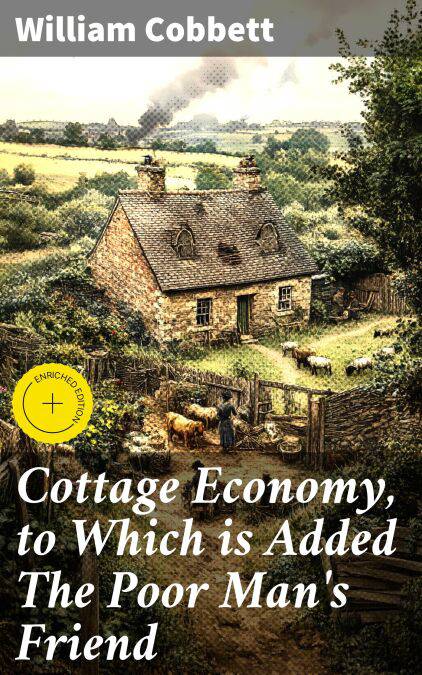
- Afhalen na 1 uur in een winkel met voorraad
- Gratis thuislevering in België vanaf € 30
- Ruim aanbod met 7 miljoen producten
- Afhalen na 1 uur in een winkel met voorraad
- Gratis thuislevering in België vanaf € 30
- Ruim aanbod met 7 miljoen producten
Zoeken
Cottage Economy, to Which is Added The Poor Man's Friend E-BOOK
Enriched edition. Practical Guide to Sustainable Living and Economic Justice
William Cobbett
E-book | Engels
€ 0,49
Uitvoering
Omschrijving
In "Cottage Economy, to Which is Added The Poor Man's Friend," William Cobbett presents a compelling exploration of rural self-sufficiency and the intricacies of the agricultural life in early 19th-century England. Written in a straightforward yet engaging prose, Cobbett's work serves not only as a guide for the impoverished rural population but also as a critique of the socioeconomic structures that marginalize them. His literary style is pragmatic, laced with personal anecdotes and a wealth of practical advice, reflecting the emerging dialog in the context of the Industrial Revolution and its impact on traditional agrarian lifestyles. William Cobbett was a prominent journalist, political radical, and social reformer, deeply concerned with the plight of the working class. His lived experiences as a farmer and a laborer, coupled with his dissatisfaction with the growing disparities of wealth in England, compelled him to impart knowledge through this book. Cobbett's background and unwavering advocacy for the rights of the poor thus inform his passionate writing, making it an essential text in the canon of social and political literature. I highly recommend "Cottage Economy" to readers interested in the intersections of agricultural practices, economic reform, and social justice. Cobbett's insights resonate even today, echoing the perennial struggles for equality and self-sufficiency. This work not only enriches our understanding of historical socio-economic conditions but also inspires contemporary discourse on sustainable living.
In this enriched edition, we have carefully created added value for your reading experience:
- A succinct Introduction situates the work's timeless appeal and themes.
- The Synopsis outlines the central plot, highlighting key developments without spoiling critical twists.
- A detailed Historical Context immerses you in the era's events and influences that shaped the writing.
- A thorough Analysis dissects symbols, motifs, and character arcs to unearth underlying meanings.
- Reflection questions prompt you to engage personally with the work's messages, connecting them to modern life.
- Hand‐picked Memorable Quotes shine a spotlight on moments of literary brilliance.
- Interactive footnotes clarify unusual references, historical allusions, and archaic phrases for an effortless, more informed read.
In this enriched edition, we have carefully created added value for your reading experience:
- A succinct Introduction situates the work's timeless appeal and themes.
- The Synopsis outlines the central plot, highlighting key developments without spoiling critical twists.
- A detailed Historical Context immerses you in the era's events and influences that shaped the writing.
- A thorough Analysis dissects symbols, motifs, and character arcs to unearth underlying meanings.
- Reflection questions prompt you to engage personally with the work's messages, connecting them to modern life.
- Hand‐picked Memorable Quotes shine a spotlight on moments of literary brilliance.
- Interactive footnotes clarify unusual references, historical allusions, and archaic phrases for an effortless, more informed read.
Specificaties
Betrokkenen
- Auteur(s):
- Uitgeverij:
Inhoud
- Aantal bladzijden:
- 294
- Taal:
- Engels
Eigenschappen
- Productcode (EAN):
- 4057664638144
- Verschijningsdatum:
- 21/11/2019
- Uitvoering:
- E-book
- Beveiligd met:
- Digital watermarking
- Formaat:
- ePub

Alleen bij Standaard Boekhandel
Beoordelingen
We publiceren alleen reviews die voldoen aan de voorwaarden voor reviews. Bekijk onze voorwaarden voor reviews.








